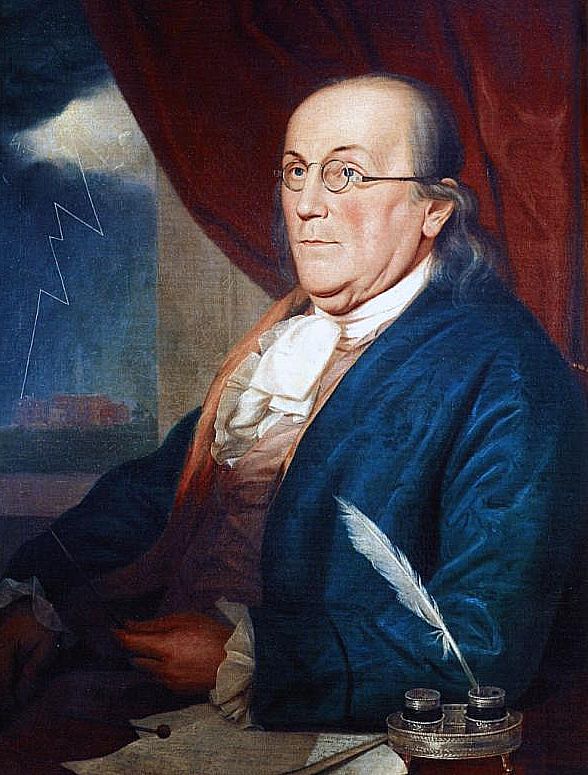Civilization
A Republic, If You Can Keep It
Remembering Elizabeth Willing Powel, to whom Benjamin Franklin famously said the people now had a republic, if they could keep it.

Remembering Elizabeth Willing Powel, to whom Benjamin Franklin famously said the people now had a republic, if they could keep it.
It’s Friday, Sept. 20.1 Interestingly, Election “Day,” which is now a profound misnomer, begins today: In Virginia, Minnesota, and South Dakota, citizens 18 and older can begin voting in the 2024 presidential election.
Today is also the day of the week when I share a quote intended to be uplifting or educational. Earlier this week I wrote about Constitution Day, which fell on Tuesday, although the administration encourages us to think of this as “Constitution Week.”
A Republic, if you can keep it
I’m all for that, especially since the proclamation issued in President Biden’s name reprised the famous Benjamin Franklin “a Republic, if you can keep it” exchange. The White House didn’t garble the exchange as so many others have done. Nor did it provide the context that really makes the exchange so interesting – and so contemporary.
So how do we know about Ben Franklin’s profound “if you can keep it” rejoinder concerning the type of government forged at the Constitutional Convention in 1787?
The original source – the only source, actually – is a Scots-Irish immigrant from County Antrim named James McHenry, who arrived on these shores at 18. Young Mr. McHenry apprenticed as a physician under Benjamin Rush, a Founding Father from Philadelphia, and followed Rush into service as a military surgeon in George Washington’s army. Captured by the British during the war, McHenry was paroled, only to rejoin the Continental Army. He was with Washington at Monmouth and attached to Lafayette’s troops at Yorktown.
After the war, he was one of Maryland’s representatives to the Constitutional Convention and kept a regular diary. It is in that journal that McHenry records an exchange he apparently overheard – or heard from someone else – on Sept. 18, 1787, the last day of the convention:
“A lady asked Dr. Franklin Well Doctor what have we got a republic or a monarchy – A republic replied the Doctor if you can keep it.”
Who asked that question?
“Dr. Franklin” was an honorific for Ben Franklin, but who was the lady in question? Even though it’s not a mystery, succeeding generations of historians and politicians have obscured her identity – to their detriment and ours.
In his 2019 memoir, “A Republic, If You Can Keep It,” Neil Gorsuch flubs the facts of the story that forms the very title of his book. He writes that “a passerby asked what kind of government the delegates intended to propose” – thereby confusing the time sequence and hiding the identity of Franklin’s interlocutor.
A month after the book’s publication, House Speaker Nancy Pelosi took further liberties with the historical record.
Announcing the first impeachment inquiry of President Donald Trump, Pelosi said, “On the final day of the Constitutional Convention in 1787, when our Constitution was adopted, Americans gathered on the steps of Independence Hall to await the news of the government our founders had crafted. They asked Benjamin Franklin, ‘What do we have, a republic or a monarchy?’ Franklin replied, ‘A republic, if you can keep it.’ Our responsibility is to keep it.”
At least Pelosi had the time element correct. But the crowd on the steps of Independence Hall was a concoction.
The real Elizabeth Willing Powel
Even those who don’t airbrush “the lady” Franklin spoke to that day give her short shrift. In his best-selling biography of Benjamin Franklin, Walter Isaacson properly identifies her, but hardly in complimentary fashion. He describes her an “anxious lady” who “accosted” Franklin. The author also mangles the famous quotation, having her ask, “What have you given us” rather than “What have we got …”
This is not a minor lapse, according to historian Zara Anishanslin, an expert in the Revolutionary War period, as it implies “her passive role in the political process.” Professor Anishanslin adds, “She is cast as a shrill, inappropriate woman, excluded from the politics of the nation’s founding.”
But this is not how Franklin’s contemporaries in Philadelphia would have viewed her. They would have known, or at least assumed, that Franklin’s inquirer was the erudite and well-connected Elizabeth Willing Powel. But James McHenry doesn’t require us to guess. His journal entry adds helpfully, “The Lady here alluded to was Mrs. Powel of Philada.”
It’s a sorry sign about the state of modern education that Eliza Powel is largely forgotten. She was just as much a Founding Father as James McHenry and the other signers of the Constitution (though Founding Mother is more precise).
Powel was more active than merely to ask a single question
Although no women were chosen as delegates to the Constitutional Convention, Mrs. Powel’s influence in these colonies was never in question. The wife of prosperous businessman Samuel Powel, she was known for convening salons that wrestled with the hardest questions of the day, including whether to break with Great Britain.
And not to diminish Samuel Powel, but the wealth and connections that made their home the epicenter in Pennsylvania politics and Philadelphia society originally came from her side of the family. Elizabeth’s father Charles Willing and her brother Thomas Willing were rich traders and merchants who served, as did Samuel Powel, as early mayors of Philadelphia. Eliza Powel wasn’t content just to enjoy the perks of power and wealth. In dinner parties at her home (the guests frequently included George and Martha Washington), she displayed a shrewd grasp of politics and a willingness and the intellectual dexterity to join the discussion that led to a new kind of government.
The political figure in modern America who seems to me most like Elizabeth Powel is Nancy Pelosi. Her father and brother were both mayors of Baltimore, and Pelosi’s father also served in the House of Representatives. Upon relocating to California, Nancy Pelosi befriended Phil and Sala Burton. One could say, a bit puckishly, that the Burtons were the George and Martha Washington of San Francisco in those years. (All of which is why Pelosi’s flight of rhetorical fancy regarding Ben Franklin and Eliza Powel seemed so discordant.)
Why did even Powel herself forget that exchange?
In any event, in the 1780s the Powels were close friends of the Washingtons. Evidence in the form of letters found in the George Washington Papers at the Library of Congress shows that George Washington valued Eliza’s counsel greatly. That was a good thing for American history. In the third year of his presidency, George Washington confided in friends how much he longed to leave government and return to Mount Vernon. The friend whom Washington biographers credit with talking him out of it was none other than Elizabeth Powel.
James McHenry didn’t publish his account of the Franklin-Powel exchange until 1803, and even then he did so anonymously. He added other details, too, describing Powel as “a lady remarkable for her understanding and wit.” He also fleshed out the scene and had Franklin “entering the room” to talk to Powel.
Over time, friends began to ask Powel about the exchange. She didn’t remember it. Not because, as she wrote to a friend in 1814, it didn’t happen. But because she’d had so many momentous discussions over the years with the Founders and their contemporaries that 27 years later she couldn’t begin to recall them all.
Or, as she put it, she had been “associated with the most respectable, influential Members of the Convention that framed the Constitution, and that the all important Subject was frequently discussed at our House.”
Why should we get it right?
So why does the accuracy of this anecdote matter? That’s the question Zara Anishanslin posed when writing about it five years ago. Here is her answer:
“Tracing its twists and turns over the centuries, we see Powel, a politically active, influential patriot in her own time, shaped to mold expectations about the history of women and politics. The story shifts – from her own assertion that she couldn’t possibly remember all the many important political conversations that took place within her home, to one in which she is simply an ‘anxious’ lady ‘accosting’ Franklin, to the recent omission of women at all.
“As we consider how and why America continues to elide the history of founding women from its collective origin story, we should take note that in 2019 we actually give less credit to this politically savvy woman than men did during the founding era,” Anishanslin added before concluding: “Recognizing women’s leadership in the past, as well as the present, might make it easier to keep a republic.”
And that is our quote of the week.
This article was originally published by RealClearPolitics and made available via RealClearWire.
Editor’s Note
1 RealClearWire released this article at least two days late, so the publication date on CNAV does not match this text.
Carl M. Cannon is the Washington Bureau Chief of RealClearPolitics and Executive Editor of RealClear Media Group. Carl is a past recipient of the Gerald R. Ford Journalism Prize for Distinguished Reporting and the Aldo Beckman Award, the two most prestigious awards for White House coverage. Previous positions include executive editor of PoliticsDaily.com, D.C. bureau chief for Reader's Digest and White House correspondent for both the Baltimore Sun and National Journal. He was a 2007 fellow-in-residence at Harvard University's Institute of Politics, a past president of the White House Correspondents’ Association, and is a published author.
-

 Accountability2 days ago
Accountability2 days agoWaste of the Day: Principal Bought Lobster with School Funds
-

 Constitution2 days ago
Constitution2 days agoTrump, Canada, and the Constitutional Problem Beneath the Bridge
-

 Executive17 hours ago
Executive17 hours agoHow Relaxed COVID-Era Rules Fueled Minnesota’s Biggest Scam
-

 Civilization16 hours ago
Civilization16 hours agoThe End of Purple States and Competitive Districts
-

 Civilization4 days ago
Civilization4 days agoThe devil is in the details
-

 Executive4 days ago
Executive4 days agoTwo New Books Bash Covid Failures
-

 Civilization3 days ago
Civilization3 days agoThe Conundrum of President Donald J. Trump
-

 Executive4 days ago
Executive4 days agoThe Israeli Lesson Democrats Ignore at Their Peril








